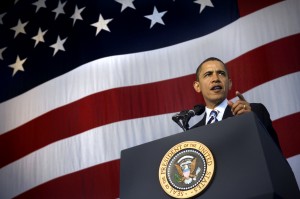Washington is turning toward common ground
President Barack Obama faced a daunting challenge as he took the podium in front of a joint session of Congress on Tuesday evening for his second State of the Union address.
Despite all of his campaign references to a spirit of bipartisanship, the American political arena has become increasingly more divisive in the first years of Obama’s presidency.
In the 2010 midterm elections, the Republican Party gained control of the House of Representatives and made significant gains in the Senate.
With Democrats still reeling from the midterm elections, Obama insisted on bipartisan cooperation, although he did not attempt to fix his image with voters and he did not back down from challenging the GOP on certain issues. Instead, he decided to keep a careful eye turned toward the future.
The president’s glowing rhetoric shone through at the start of his speech as he recognized Rep. Gabrielle Giffords, who is recovering from an apparent assassination attempt. Obama urged Congress to learn from the tragedy.
“Tucson reminded us that no matter who we are or where we come from, each of us is a part of something greater — something more consequential than party or political preference,” he said.
From there, Obama began to paint a picture of his plans for the future of an America that the eternal idealist sees as “poised for progress.”
He explained that for Americans, progress is more than just improving stock values or a growing economy. It’s the personal progress of attaining dreams and securing the opportunity for a better life.
Obama’s rhetoric carried a darker tone than his campaign speeches of 2008. He once again evoked the idea of “change,” only this time in reference to a shift away from a time when jobs were more readily accessible to Americans.
“That world has changed,” he said. “And for many, the change has been painful. I’ve seen it in the shuttered windows of once booming factories, and the vacant storefronts on once busy Main Streets.”
With such worries haunting the minds of many Americans, Obama struck a comfortable balance between reassuring the public about the current situation and providing hope for the future.
He reminded his audience that the United States still has the world’s largest economy and best colleges and universities.
At times, though, his attempts at re-energizing the American public did came across as forced and overly patriotic.
“We need to out-innovate, out-educate, and out-build the rest of the world,” he declared, to raucous applause.
His statements sometimes felt too much like a pep talk, more fitting in a rally than in a State of the Union Address.
His message, however, could not have been more relevant to Americans.
Obama took some of his strongest stands against the Republicans on the topics of immigration and health care reform.
Although he never explicity mentioned the DREAM Act, which failed to pass in December and would have given illegal aliens who graduated from U.S. high schools the opportunity to earn conditional permanent residency, he stressed the need for protecting our borders while still retaining and developing people like foreign students or children of undocumented immigrants.
“And let’s stop expelling talented, responsible young people who could be staffing our research labs, or starting a new business, who could be further enriching this nation,” he said.
Obama also addressed his new policies that have taken shape in the past years.
With regard to his health care reform act, Obama said he would be eager to work with Congress on improving the bill, but he rightfully took a firm defense for the reforms of insurance company practices.
In the later stages of his address, however, Obama’s argument seemed to weaken.
He attempted to prove to his audience that he could control spending by proposing a freeze on annual domestic spending for the next five years, but he did little to explain how that would be reconciled with his plans for an improved American infrastructure and education system.
For what it was, though, Obama delivered a solid speech, as did Rep. Paul Ryan, who gave the official Republican response.
Ryan smartly avoided being too confrontational, even saying that “no one person or party is responsible” for the national debt.
Through Obama’s speech and Ryan’s response, Congress demonstrated that the tide is slowly turning toward a more bipartisan government.
Jared Servantez is a freshman majoring in print and digital journalism.


The first new rule says you HAVE to have insurance. Both my husband and I have pre-existing conditions, and although the new bill says we can’t be denied coverage because of it. So far, the cheapest health insurance we’ve been able to find is called “Wise Health Insurance” search for it online if you are pre-existing conditions.